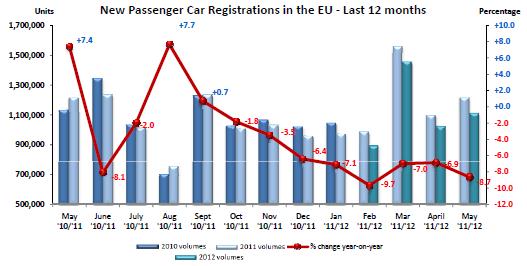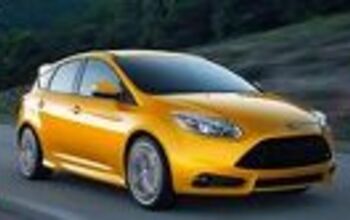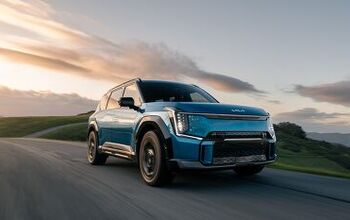Europe In May 2012: Losses Widen

The European car market – if taken together, the world’s second largest behind China and before the U.S. – continues its slow drift to the bottom. Sales in May were down by 8.7 percent in the EU. This is the eighth month in a row that sales are in minus territory. Five months into the year, the market is down 7.7 percent.
18 out of 26 EU countries are down, now including all volume markets except the U.K. Greece leads the list of laggards with sales down 47.3 percent. However, the crisis is no longer a southern affair. Second worst country in terms of sales is Finland.
May %Share UnitsUnits% Chg ’12’11’12’1112/11ALL BRANDS** 1,106,8451,211,665-8.7VW Group24.623.8272,157288,701-5.7VOLKSWAGEN12.912.8142,628154,768-7.8AUDI5.75.163,39561,623+2.9SEAT2.12.223,07227,039-14.7SKODA3.93.742,79545,053-5.0Others (1)0.00.0267218+22.5PSA Group12.013.6132,561164,677-19.5PEUGEOT6.57.372,11488,101-18.1CITROEN5.56.360,44776,576-21.1RENAULT Group8.69.094,814109,105-13.1RENAULT6.67.373,36688,099-16.7DACIA1.91.721,44821,006+2.1GM Group8.98.998,873107,885-8.4OPEL/VAUXHALL7.47.781,48992,887-12.3CHEVROLET1.61.217,37114,954+16.2GM (US)0.00.01344-70.5FORD7.68.084,39396,756-12.8FIAT Group7.37.680,58992,166-12.6FIAT5.45.659,43967,549-12.0LANCIA/CHRYSLER0.90.89,6459,605+0.4ALFA ROMEO0.81.08,77912,490-29.7JEEP0.20.22,3571,897+24.2Others (2)0.00.1369625-41.0BMW Group6.46.270,50474,951-5.9BMW5.14.956,88359,044-3.7MINI1.21.313,62115,907-14.4DAIMLER5.25.157,97761,734-6.1MERCEDES4.64.451,10353,843-5.1SMART0.60.76,8747,891-12.9TOYOTA Group3.93.243,33338,506+12.5TOYOTA 3.73.041,30036,624+12.8LEXUS0.20.22,0331,882+8.0NISSAN2.93.231,97938,429-16.8HYUNDAI3.12.734,44832,583+5.7KIA2.81.930,55623,527+29.9VOLVO CAR CORP.1.71.818,38421,801-15.7SUZUKI1.21.113,19213,861-4.8HONDA1.00.810,7589,546+12.7JAGUAR LAND ROVER Group0.80.69,4026,991+34.5LAND ROVER0.70.47,5125,188+44.8JAGUAR0.20.11,8901,803+4.8MAZDA0.70.87,9839,956-19.8MITSUBISHI0.60.86,4099,574-33.1OTHER**0.80.98,53210,916-21.8Manufacturer-wise, all large European manufacturers are down, led by PSA (-19.5 percent), Renault ( – 13.1 percent), Ford (-12.8 percent) and Fiat (-12.6 percent).
The GM Group is down 8.4 percent. Losses at Opel (-12.3 percent) are offset by a 16.2 percent gain at Chevrolet.
In May, a total of 13 GM cars are listed as imported from the U.S. Following Detroit logic, which postulates that a market must be closed if American cars don’t sell , complaints at the WTO should be imminent.
As predicted yesterday, Volkswagen’s sales are down in Europe. They are down 5.7 percent in May, they are down 2.4 percent January through May. Volkswagen’s data department lists sales as unchanged in May, and up by 1.3 percent January through May. Must be a different Europe.
Data are available here as PDF and here as Excel file.

Bertel Schmitt comes back to journalism after taking a 35 year break in advertising and marketing. He ran and owned advertising agencies in Duesseldorf, Germany, and New York City. Volkswagen A.G. was Bertel's most important corporate account. Schmitt's advertising and marketing career touched many corners of the industry with a special focus on automotive products and services. Since 2004, he lives in Japan and China with his wife <a href="http://www.tomokoandbertel.com"> Tomoko </a>. Bertel Schmitt is a founding board member of the <a href="http://www.offshoresuperseries.com"> Offshore Super Series </a>, an American offshore powerboat racing organization. He is co-owner of the racing team Typhoon.
More by Bertel Schmitt
Latest Car Reviews
Read moreLatest Product Reviews
Read moreRecent Comments
- Tassos Obsolete relic is NOT a used car.It might have attracted some buyers in ITS DAY, 1985, 40 years ago, but NOT today, unless you are a damned fool.
- Stan Reither Jr. Part throttle efficiency was mentioned earlier in a postThis type of reciprocating engine opens the door to achieve(slightly) variable stroke which would provide variable mechanical compression ratio adjustments for high vacuum (light load) or boost(power) conditions IMO
- Joe65688619 Keep in mind some of these suppliers are not just supplying parts, but assembled components (easy example is transmissions). But there are far more, and the more they are electronically connected and integrated with rest of the platform the more complex to design, engineer, and manufacture. Most contract manufacturers don't make a lot of money in the design and engineering space because their customers to that. Commodity components can be sourced anywhere, but there are only a handful of contract manufacturers (usually diversified companies that build all kinds of stuff for other brands) can engineer and build the more complex components, especially with electronics. Every single new car I've purchased in the last few years has had some sort of electronic component issue: Infinti (battery drain caused by software bug and poorly grounded wires), Acura (radio hiss, pops, burps, dash and infotainment screens occasionally throw errors and the ignition must be killed to reboot them, voice nav, whether using the car's system or CarPlay can't seem to make up its mind as to which speakers to use and how loud, even using the same app on the same trip - I almost jumped in my seat once), GMC drivetrain EMF causing a whine in the speakers that even when "off" that phased with engine RPM), Nissan (didn't have issues until 120K miles, but occassionally blew fuses for interior components - likely not a manufacturing defect other than a short developed somewhere, but on a high-mileage car that was mechanically sound was too expensive to fix (a lot of trial and error and tracing connections = labor costs). What I suspect will happen is that only the largest commodity suppliers that can really leverage their supply chain will remain, and for the more complex components (think bumper assemblies or the electronics for them supporting all kinds of sensors) will likley consolidate to a handful of manufacturers who may eventually specialize in what they produce. This is part of the reason why seemingly minor crashes cost so much - an auto brand does nst have the parts on hand to replace an integrated sensor , nor the expertice as they never built them, but bought them). And their suppliers, in attempt to cut costs, build them in way that is cheap to manufacture (not necessarily poorly bulit) but difficult to replace without swapping entire assemblies or units).I've love to see an article on repair costs and how those are impacting insurance rates. You almost need gap insurance now because of how quickly cars depreciate yet remain expensive to fix (orders more to originally build, in some cases). No way I would buy a CyberTruck - don't want one, but if I did, this would stop me. And it's not just EVs.
- Joe65688619 I agree there should be more sedans, but recognize the trend. There's still a market for performance oriented-drivers. IMHO a low budget sedan will always be outsold by a low budget SUV. But a sports sedan, or a well executed mid-level sedan (the Accord and Camry) work. Smaller market for large sedans except I think for an older population. What I'm hoping to see is some consolidation across brands - the TLX for example is not selling well, but if it was offered only in the up-level configurations it would not be competing with it's Honda sibling. I know that makes the market smaller and niche, but that was the original purpose of the "luxury" brands - badge-engineering an existing platform at a relatively lower cost than a different car and sell it with a higher margin for buyers willing and able to pay for them. Also creates some "brand cachet." But smart buyers know that simple badging and slightly better interiors are usually not worth the cost. Put the innovative tech in the higher-end brands first, differentiate they drivetrain so it's "better" (the RDX sells well for Acura, same motor and tranmission, added turbo which makes a notable difference compared to the CRV). The sedan in many Western European countries is the "family car" as opposed to micro and compact crossovers (which still sell big, but can usually seat no more than a compact sedan).
- Jonathan IMO the hatchback sedans like the Audi A5 Sportback, the Kia Stinger, and the already gone Buick Sportback are the answer to SUVs. The A5 and the AWD version of the Stinger being the better overall option IMO. I drive the A5, and love the depth and size of the trunk space as well as the low lift over. I've yet to find anything I need to carry that I can't, although I admit I don't carry things like drywall, building materials, etc. However, add in the fun to drive handling characteristics, there's almost no SUV that compares.


































Comments
Join the conversation
The Greek elections (re-elctions) are this weekend.... Depending on what or whom you believe on the different doomsday scenarios, a 7.3% drop in sales will be considered wonderful news in the near future.
Other than JLR the biggest winners seem to be Korean: Hyundai, Kia and Chevrolet.